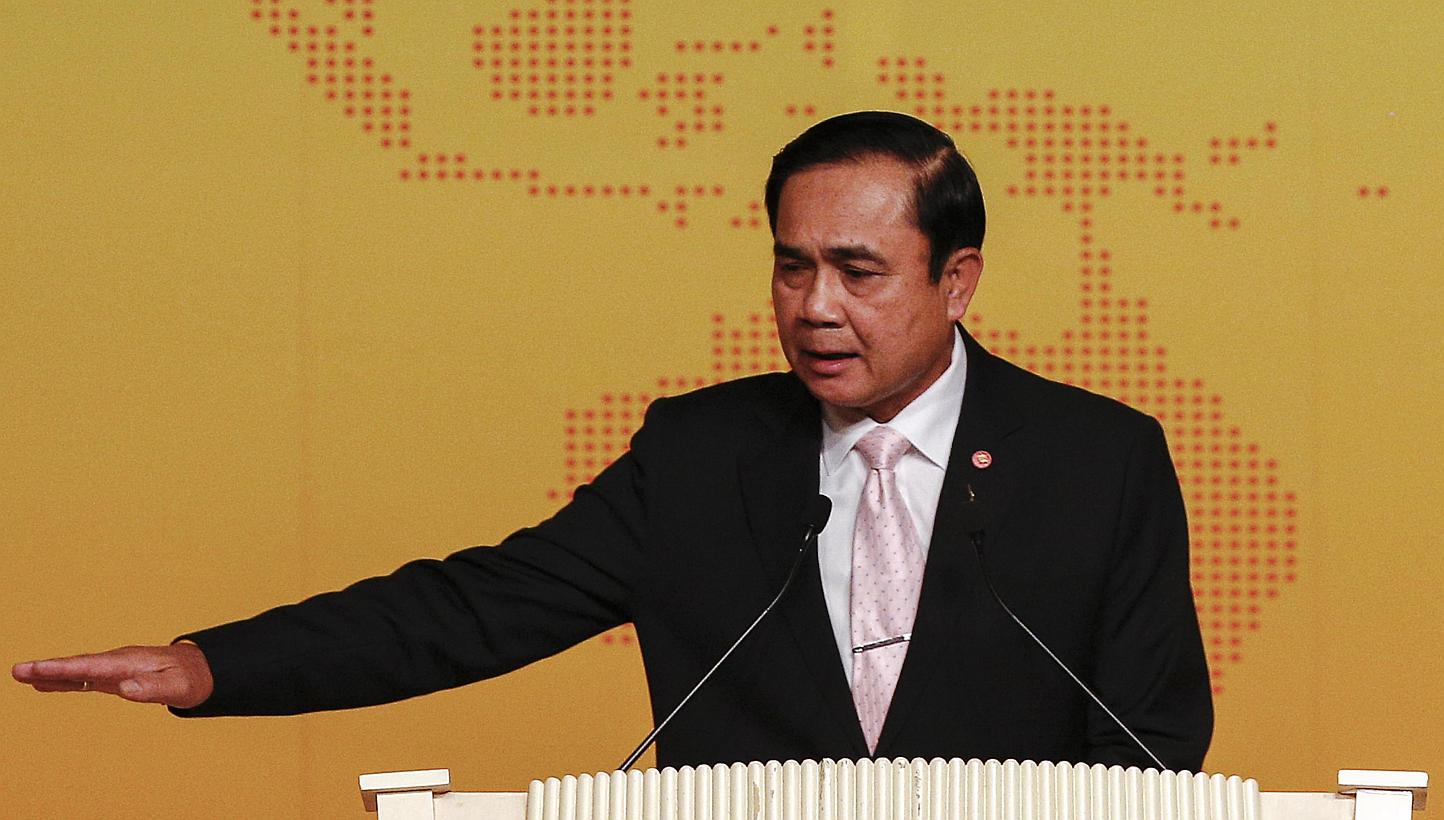Thailand PM Prayuth says he is considering replacing martial law with other laws
Sign up now: Get ST's newsletters delivered to your inbox

Follow topic:
BANGKOK (AFP/THE NATION/ASIA NEWS NETWORK) - Thailand's junta chief on Friday said he was considering lifting martial law, but only after passing a new order to replace it.
Speaking to reporters during a trip to the beachside resort of Hua Hin, former army chief turned Prime Minister Prayuth Chan-O-Cha said he had already drawn up a replacement provision.
"I have prepared for it already to be used after the martial law," he said. "If I lift the martial law, you all will know," he added.
It is the first time Gen Prayuth has indicated a potential lifting of martial law, which bans political gatherings of more than five people and outlaws criticism of the junta.
Critics, businesses and Thailand's western allies have called for martial law to be lifted.
It was imposed two days before the military takeover that followed the ousting of Yingluck Shinawatra's democratically elected government after months of often violent street protests.
But Gen Prayuth did not elaborate on what the new order would look like.
Under the interim charter the generals signed off on after seizing power, the junta already has sweeping powers to make widespread unilateral decisions.
Gen Prayuth has vowed to return power to an elected civilian government but only once reforms to tackle corruption and curb the power of political parties are codified in a new Constitution.
"I have been thinking (that) for a long time," Gen Prayuth pointed at his head and replied when asked whether the Cabinet meeting in Prachuab Kiri Khan's Hua Hin today would consider the replacement of martial law with other laws.
"I have prepared for it already to be used after the martial law," he said. "If I lift the martial law, you all will know," he added.
It is the first time Gen Prayuth has indicated a potential lifting of martial law, which bans political gatherings of more than five people and outlaws criticism of the junta.
Critics, businesses and Thailand's western allies have called for martial law to be lifted.
It was imposed two days before the military takeover that followed the ousting of Yingluck Shinawatra's democratically elected government after months of often violent street protests.
But Gen Prayuth did not elaborate on what the new order would look like.
Under the interim charter the generals signed off on after seizing power, the junta already has sweeping powers to make widespread unilateral decisions.
Gen Prayuth has vowed to return power to an elected civilian government but only once reforms to tackle corruption and curb the power of political parties are codified in a new Constitution.
"I have been thinking (that) for a long time," Gen Prayuth pointed at his head and replied when asked whether the Cabinet meeting in Prachuab Kiri Khan's Hua Hin today would consider the replacement of martial law with other laws.
Asked if Article 44 of the Provisional Constitution, which gives the NCPO head "absolute power", was an option, he smiled and said: "I'm thinking. We will try our best to make officials comfortable when doing their duties."
He said the measure in the new law would be equal to martial law so that the people will know that the NCPO did not fully enforce it.
Gen Prayuth appeared to be in a good mood after returning from a trip to Brunei. Before he left Thailand on Wednesday, he appeared tense and angry with the media.
Article 44 gives the NCPO leader "absolute power" to issue any order "for the sake of reforms in any field, the promotion of unity and harmony amongst the people of the nation, or the prevention, abatement or suppression of any act detrimental to national order or security, royal throne, national economy or public administration, whether the act occurs inside or outside the Kingdom".
Orders that are so issued are all deemed "lawful, constitutional and final".
Deputy Prime Minister Prawit Wongsuwan, who oversees security affairs, admitted that the legal team of the NCPO was drafting a new law to replace martial law.
He said the drafting would include writing a new law and adjusting the current security law.
"We are trying to reduce pressure. The United Nations asked us to (find a new law). I didn't set the deadline (for the completion of the draft) because it will not trouble anyone. We now enforce only summons, arrests and searches (of the martial law)," he said.
He denied the Cabinet meeting today would consider the matter.
He insisted that security law was needed to replace martial law because those who have ill intent still exist.
The voices against martial law and the use of the military court for civilians under martial law have been around even before the military coup of May 22 as martial law was imposed by Gen Prayuth when he was Army chief two days before he staged the coup.
Experts argue that the military court is not meant for civilians, as defendants have no right to appeal.
What's more, judges are not totally independent of the military chain of command.
As for martial law, critics have denounced the use of martial law to detain hundreds without charge since the coup. The law permits detention without charge for up to seven days. Some allegations of torture have been made by detainees while under military custody, at times, in secret locations where detainees were held incommunicado.
International organisations such as the United Nations and non-governmental organisations like Human Rights Watch and Amnesty International have criticised both the use of martial law and use of the military court on civilians.
As the situation drags on and more people are being put through military court, it's expected that the resistance and condemnation will continue.

